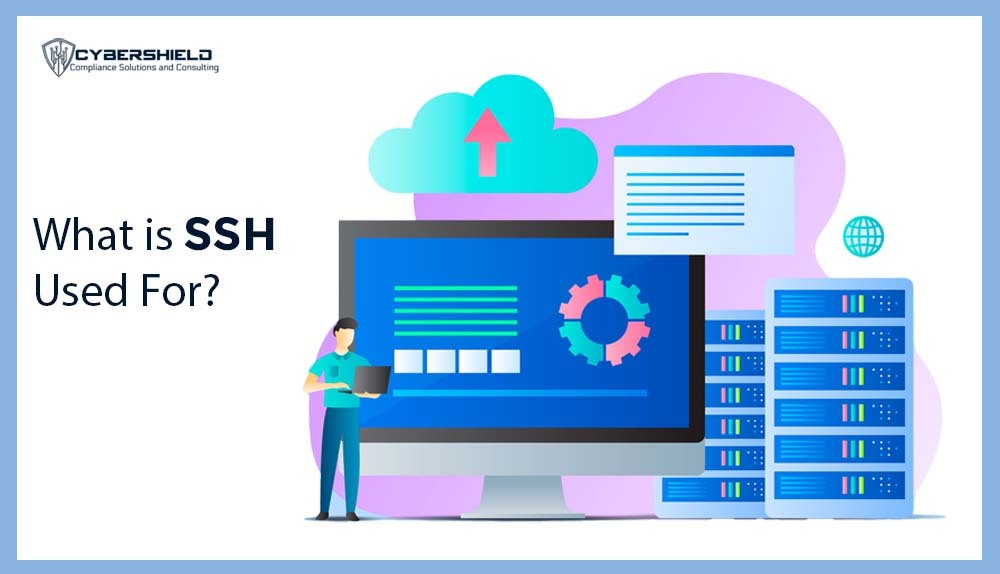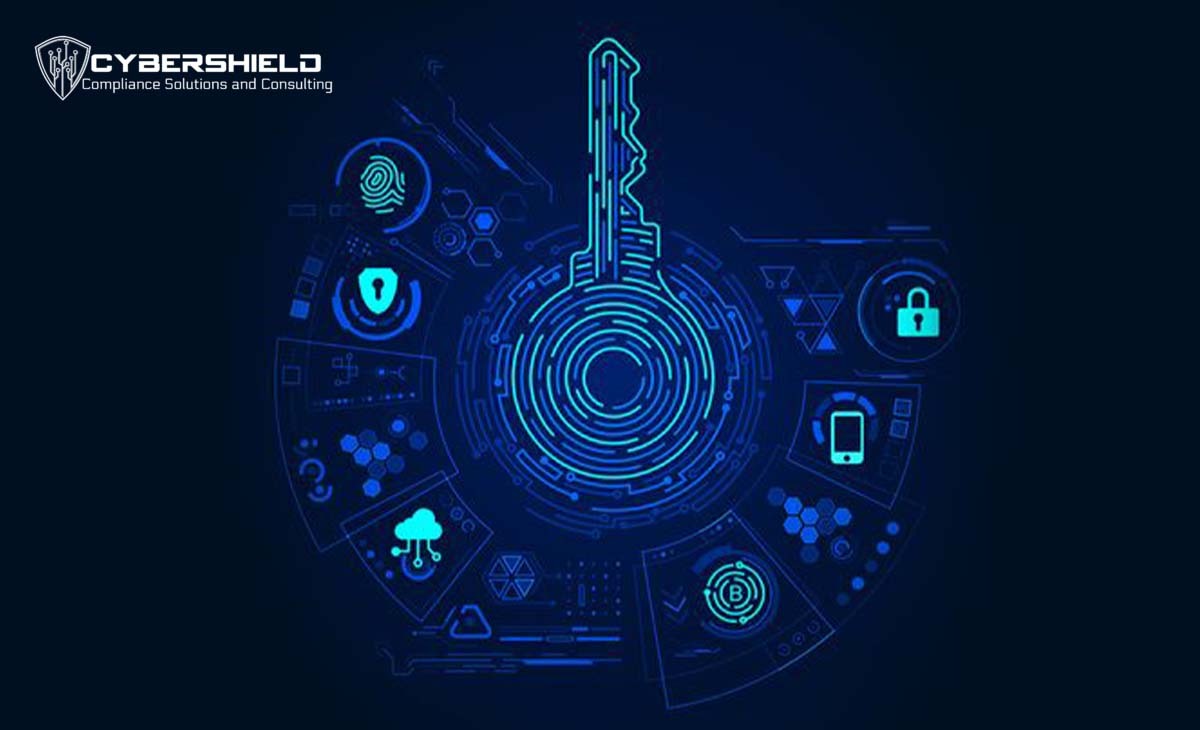What Is SSH (Secure Shell)? Meaning, Working, Benefits, and Limitations
In today’s interconnected world, secure communication is the foundation of digital trust. Whether system administrators manage servers, developers deploy applications, or businesses protect sensitive information, secure channels are critical to preventing data breaches and maintaining compliance with frameworks such as HIPAA compliance requirements and Cybersecurity with the CIS Controls. SSH (Secure Shell) is a popular protocol for encrypting and authenticating remote communication.
Secure Shell (SSH) is now the industry standard for secured file transfers and remote administration. So, how exactly does Secure Shell function, and why is it thought to be more secure than alternatives like Telnet and FTP?
What is the Secure Shell (SSH) Protocol?
SSH (Secure Shell) is a cryptographic network protocol that enables secure communication between two systems over an insecure network. It provides encrypted command-line access to remote servers, allowing system administrators and IT professionals to manage devices, transfer files, and establish encrypted tunnels.
In simpler terms, SSH creates a secure channel where users can send commands and data without the risk of interception, manipulation, or eavesdropping.
Primary Uses of SSH
- Secure distant Server Access: SSH is the most used secure means to connect to remote servers. System administrators can log in remotely without exposing their credentials or session data to attackers. SSH is a secure way to manage Linux and Unix servers on public or unsecured networks since all communication is encrypted.
- Remote Command Execution: SSH enables users run commands on remote systems. Maintenance, problem-solving, and scripting on several systems require this feature. Modern DevOps environments value automation and efficiency, thus it’s crucial.
- Secure File Transfers: SSH helps you send files securely via SCP and SFTP. These programs encrypt files, backups, and configuration data to prevent interceptions. Many prefer SSH-based file transfers over FTP, which is less secure.
- Tunnelling and Port Forwarding: SSH is also used to create encrypted tunnels between systems. This helps users securely access internal services, applications, and databases not available online. For protecting aging systems or critical network connections, SSH tunneling is useful.
- SSH authentication: Instead of passwords, SSH employs cryptographic key pairs to verify users. This strategy dramatically reduces brute-force attacks and password theft. Many firms employ SSH keys, role-based access controls, and multi-factor authentication for security.
What does SSH do?
Remember that SSH is a technology that can accomplish many things when someone asks you, “What does Secure Shell do?” This security architecture keeps computer communication safe over networks that aren’t trusted, like the Internet. SSH keeps remote logins, file transfers, and tunneled connections safe.

SSH has three levels of security at its core:
1) Authenticate
Authentication tells clients and servers who they are talking to. SSH has a number of ways to verify your identity, such as:
Password-based authentication is the easiest yet least secure since weak or overused passwords can be brute-forced.
Public-key authentication is a safer way to do things that employs a private key saved on the client and a public key stored on the server. Only the person who has the private key can get in.
Certificate-based authentication: Used by businesses to manage and verify identities from one place.
SSH checks the identities of users and devices before letting them in, which stops illicit logins and lowers the risk of compromised accounts. This keeps data safe and meets HIPAA regulations.
2) Encryption
Encryption is what SSH needs. It makes data between clients and servers hard for people outside to understand. If attackers intercept the communication, they see data that is useless and mixed up.
SSH combines: Asymmetric encryption (public/private keys) builds trust at the first handshake.
Once set up, symmetric encryption (which uses a shared session key) lets people talk to each other quickly and securely.
SSH connections keep passwords, medical records, financial transactions, and intellectual property safe, in line with Cyber Compliance Solutions and CIS Controls.
3) Integrity
Attackers can modify data while it is being sent even if it is encrypted and authenticated. SSH uses cryptographic hash algorithms and message authentication codes (MACs) to keep data safe. SSH will end the connection if even one character is changed.
Administrators sending directives from afar or companies sending compliance reports can be sure that their data will get there safely. This keeps industries that are regulated, like healthcare and finance, safe.
How SSH Works
SSH, or Secure Shell, is a common network protocol that lets people access and operate machines that are far away via networks that aren’t safe. SSH encrypts all data that is sent over the internet to ensure privacy, integrity, and authentication.
The client and server execute a secure handshake to start an SSH connection. Both systems agree on how to encrypt sessions and which cryptographic standards to utilize throughout this talk. This makes sure that everything is safe and works well together.
Next, the server uses a public cryptographic key to show the client who it is. The client checks this key against trusted entries to stop man-in-the-middle attacks. SSH uses asymmetric cryptography to send encryption keys safely after the server has been checked. These keys are used to make a session key, which makes symmetric encryption faster for the rest of the connection.
After making a secure connection, SSH checks the users. Two-factor authentication, SSH key pairs, and passwords all work. Businesses utilize public key authentication because it is the safest way.
SSH always validates the integrity of data to make sure it doesn’t get modified or intercepted while it’s being sent.
Does SSH present any security risks?
- Weak Passwords
One of the biggest problems is weak or default passwords. SSH encrypts all communication, yet an attacker can access vital systems by guessing or brute-forcing a password. Password-only authentication leaves enterprises insecure.
- Unmanaged SSH Keys
Unmanaged SSH keys are another issue. Keys for remote automation or password-free logins may get stale, forgotten, or “orphaned” when employees depart an organization.
- Escalating Privilege
Improper key or access management might escalate privileges. Attackers can get broad access to many systems by compromising SSH keys stored improperly or linked to accounts with excessive rights.
- Insider Threats
Companies must also consider insider dangers. Insiders have credentials or access rights, unlike external attackers. SSH can be used by malicious or dissatisfied personnel to move laterally, extract sensitive data, or install backdoors.
SSH is a vital cybersecurity tool for secure access, encrypted communication, and industry compliance. As with any security solution, its effectiveness depends on configuration, monitoring, and management.
Cybershield CSC helps firms deploy and maintain Cyber Compliance Solutions that protect SSH and solve HIPAA and data breach compliance.
Contact Cybershield CSC today to learn how our specialists can help you comply and defend against modern threats.

